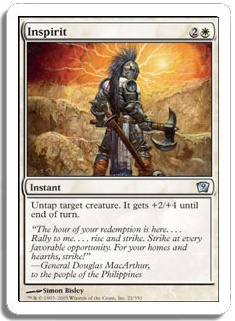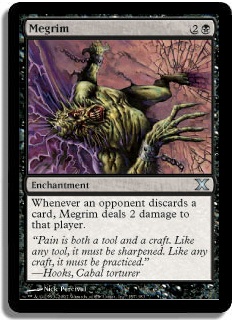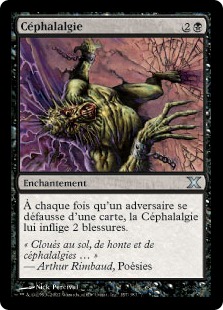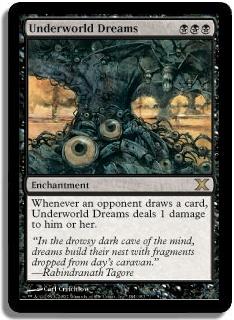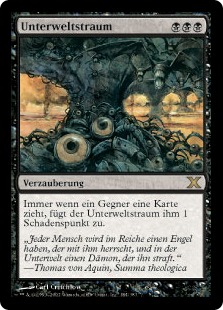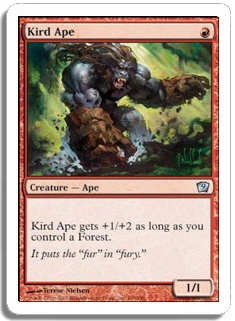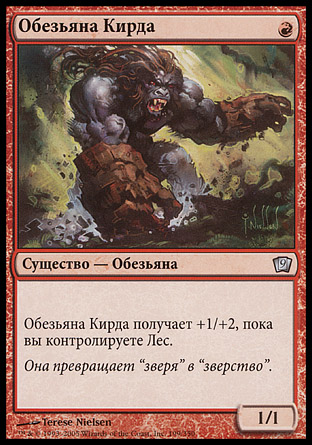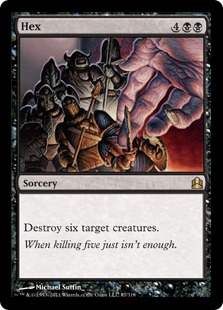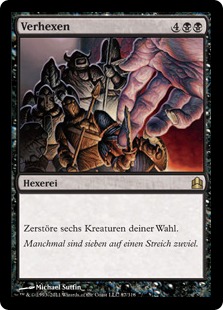„Ich bin nicht Franz!” – Franz (Gedächtnislücke or Memory Lapse, German Sixth Edition)
It’s good to be English (the language, not “a person from England,” though fellow Talent Searcher Dan Barrett does have an extraordinarily cute cat named Guinness). This site? It’s in English. Have a dispute about what a Magic card actually does? The English version is final. What language is shared by two permanent members of the United Nations Security Council? That’s right, English.

I knew that was coming. (Image: Dan Barrett)
Yet Magic would not be so popular (or so profitable) if it were printed in English alone. Though the early days had their trial-and-error moments, such as the overprinting of Legends in Italian that is reflected in the 50% discount on the StarCityGames.com buylist and the recently reversed cancellation of Korean-language cards, Magic has been a global game since Revised Edition and will remain that way.
None of this would be possible without the localizers and translators who make Magic work for players around the globe. (A list circa 2008 can be found in this Magic Arcana.) The German translator Hanno Girke received his due from Doug Beyer in an Ask Wizards from November 2006 that described Girke’s creation of Franz for German flavor text. (Short version: Franz is the insane, blue, male version of English flavor text quip-wielder Jaya Ballard.)
The Ask Wizards answer also revealed that when it comes to flavor text, the translators have a rather free hand to shape or even scrap flavor text that is unsuitable in a foreign language; wordplay flavor text in particular, so dependent on the vagaries of English, is a translator’s bane. As a result, while different flavor text on non-English cards is not common, neither is it surprising when it does appear.
Other times, flavor text is changed for cultural reasons. Look at the 9th Edition version of Inspirit and answer this question: in what language would this card have alternate flavor text? There are multiple right answers, but one is more obvious than the rest.
…
…
…
If you answered “Japanese,” you’re correct. Here’s the full speech, given when General Douglas MacArthur of the United States returned to the Philippines several years after being driven out by the Japanese during World War II. Putting a Douglas MacArthur quote on a Japanese-language card would have been in poor taste; a line by James Garfield was substituted instead. (The other two languages not to use the MacArthur quote on Inspirit are German and French. Germany was an Axis power like Japan in World War II, but France was not, and players in Italy saw the MacArthur quote on the Italian printing.)
In lieu of a complete list of foreign-language alternate flavor text (a task that would overwhelm even my capacity for Compulsive Research, at least in the short term), please enjoy these selected cards and the stories of their quotes, all of which are available in the StarCityGames.com retail store, and my advice on exploring the world of alternate flavor text.
Céphalalgie | Megrim (French 7th – 10th Editions)
I have a natural bias toward real-world flavor text, and so it’s not much of a surprise that I favor the long-tenured (in French) Arthur Rimbaud quote over the various English-language stabs at appropriate flavor text. (That said, I do like “Memories cut from the mind can cut right back.”) Arthur Rimbaud is an attention-grabbing figure of 19th century French literature, if not entirely in a good way: he packed several lifetimes’ worth of brilliant debauchery into a five-year span from ages 15 to 20, during which he wrote numerous poems that are regarded as classics, and after that bout of decadence, he never went back to creative writing.
The quote on the French Megrim is attributed to his Poésies, or collected poems; more specifically, it comes from “Les Premières Communions” or “The First Communion,” the provocative statement of a lapsed Roman Catholic lashing back at religion. The use of “céphalalgies” at the close of the Rimbaud line makes an interesting connection with the meaning of the word “megrim.” In their respective languages, both “megrim” and “céphalalgie” can mean “headache,” but they also have a connotation of mental rather than merely physical pain: Merriam-Webter gives a secondary definition of “megrim” in the plural as “low spirits,” while various translations of the Rimbaud line into English render “céphalalgie” as “mental horror,” “anguish,” and so on—a rare coincidence of connotations, aptly used.
Unterweltstraum | Underworld Dreams (German 8th Edition – Magic 2010)
If Arthur Rimbaud’s poetic days were on the “drugs” side of the “Drugs or Jesus” continuum, Saint Thomas Aquinas is on the other. Yet he is known for his reason as much as his faith, if not more; the medieval genius and Doctor of the Church in Roman Catholicism was one of the great philosophers of the West during its dark ages. Though his Summa Theologica was left incomplete on his death, the sections on theology and ethics assured his place in history.
Roughly translated, the Aquinas quote reads: “Every soul in the Kingdom [of Heaven] will have an angel who rules with him, and in the underworld a demon who punishes him.” Fitting lines for a “punishing” card, though it is unclear why the German localizer opted for Aquinas over the excerpt from Rabindranath Tagore (from the poem “Fireflies”); perhaps the translation simply would not fit in the space provided, or less likely, Tagore is not so familiar to a German audience.
Обезьяна Кирд | Kird Ape (Russian 9th Edition)
Punning flavor text? The Russian localizer (or team) listened to Tim Gunn and found a way to “make it work,” and with a pun in Russian no less! The visual resemblance of the quoted words is obvious even to those who know nothing whatever of Russian or the Cyrillic alphabet; roughly translating back to English (thank you to fellow talent searcher and Muscovite Valeriy Shunkov), the pun reads, “She puts the ‘beast’ in ‘savagery.'” Getting closer to a pun in English, Google Translate suggests replacing “savagery” with “bestiality,” completely whiffing on the latter word’s…unsavory connotation.
Verhexen | Hex (German Ravnica – Commander)
Back to the German, and an interesting bit of point-and-counterpoint: whereas the English version of Hex reads “When killing five just isn’t enough,” the German suggests that seven are too many to kill at a stroke. The full wordplay of Hex unfortunately could not be translated into German; while “hex” in the sense of magic is well-established (as seen on the German Hex, the term used for the card type “Sorcery” is “Hexerei”), “hex” in the sense of the Greek root for “six” is not—the German for English’s “hexagon,” or a six-sided shape, is “sechseck,” incorporating the German word for six, “sechs.” All that does not explain, however, why the translator opted against “fünf” and for “sieben.”
Exploring Alternate Flavor Text
Researching alternate flavor text: The two best databases for this are www.magiccards.info and Gatherer, with Google Translate a boon for quick-and-dirty machine translations. While magiccards.info often has English pictures for foreign-language cards, usually it gets the flavor text correct anyway. (See: German Memory Lapse at the top of the article, German Seventh Edition Castle which shows the Macbeth-quoting English card but has the correct Friedrich Schiller flavor text listed to the right.) The best use for magiccards.info is comparing card versions to one another: the Seventh Edition Castle search turns up a Macbeth quote in English, a Schiller quote in German, and a Guy de Maupassant quote on the French version.
If you have a specific author in mind, Gatherer is an excellent tool for searching within a language. Use the “Language” link at the top to set the language to, for example, German, and do a flavor text search under the Advanced tab. Querying “Schiller” shows five German-language cards quoting him: Castle, Greater Good, Inspirit, Pendelhaven, and Swarm of Rats.
In French, Victor Hugo has six credits listed in Gatherer: Bog Wraith, Creeping Mold, Fallen Angel, Nightmare, Pariah, and Plague Beetle. This list is incomplete, however; as I mentioned in my previous article on real-world flavor text, the Renaissance Edition Vampire Bats in French also quotes Hugo. Explore the resources, but never assume they are complete, much less perfect!
Best languages for alternate flavor text: My knowledge of Japanese, Chinese, Korean, and Russian is practically nil, so I cannot offer a proper opinion on the frequency of alternate flavor text in those languages. For languages using the Roman alphabet, it is far easier for me to evaluate flavor text, as authors’ names usually are not changed from one language to another. It is easy to see, for example, that on the French 9th Edition Archivist, Mary Harris “Mother” Jones (founder of the Industrial Workers of the World or Wobblies) is nowhere to be found, but Gustave Flaubert is.
In my limited sampling, French has a strong proportion of altered flavor texts, as does German; for the 9th Edition Cruel Edict in that language, the Wilfred Owen quote from “Anthem for Doomed Youth,” speaking of the horrors of trench warfare, was swapped out for lines from a German hymn by Novalis. Just as the World War II quote was not right for the Japanese market, so too would the World War I quote have been in poor taste for the German. This is the price when an American game goes global. Yet it is not only a price, but a collecting opportunity.
As always, thanks for reading.
— JDB
@jdbeety on Twitter

